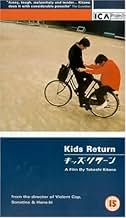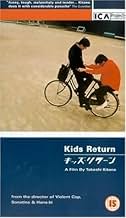NOTE IMDb
7,4/10
7,1 k
MA NOTE
Ajouter une intrigue dans votre langueDropping out of high school, two friends at first find success, one as a up-and-coming boxer and one as a low level gangster. Yet, their life decisions still find a way of catching up with t... Tout lireDropping out of high school, two friends at first find success, one as a up-and-coming boxer and one as a low level gangster. Yet, their life decisions still find a way of catching up with them.Dropping out of high school, two friends at first find success, one as a up-and-coming boxer and one as a low level gangster. Yet, their life decisions still find a way of catching up with them.
- Récompenses
- 14 victoires et 3 nominations au total
Takekazu Shigehisa
- Trainer
- (as Koichi Shigehisa)
Avis à la une
Takeshi doesn't make me disappoint again. This type is very rare to him, but he did it well. It confirmed his high level of controlling kinds of types. The character act very naturally and the living individuality affect me deeply. Comparable with his former works, it will adjoin you more. The boxing scene is stunning. The friendship of characters is unforgettable. Here I must be honor of Jô Hisaishi(the composer of this music), because it's important parts of Takeshi's work. The music is exciting and moving. Anyway it is a very meaningful movie about youth. This work attract me to look for others of Takeshi. Because I know it's my favorite directors in Japan besides Kurosawa.
Along with Fireworks, This is one of Takeshi Kitano's finest movies. The movie covers the story of 2 "juvenile delinquents" who go thru life trying to find some kind of purpose. One becomes a boxer while the other becomes a yakuza. The film seems to be saying that not enough Japanese people are not taking time to enjoy their life; that people should not be so dead serious all the time.The film also features a very good supporting performance from Susumu Terajima as a "#2 gangster". It's always good to see him in Kitano's films. For the two protagonists, it shows that it doesn't matter what they with their life as long as they enjoy it.
10D Throat
With this film Takeshi takes a look back at the past in the lives of several men who are in the same school. The two protagonists each choose their own direction: one becomes a boxer, the other joins the yakuza. The story is a reflection on how the choices a man makes can affect their lives and their relationships. As always the drama is interwoven with occasional scenes of violence, and the comedy is dark but never too depressing. Everything about Kids Return is good, and therefore another great piece of Japanse film-making.
Kids return was never given theatrical release in the US, probably because Takeshi doesn't actually act in it, and it doesn't focus on Yakuza. Despite this, it is one of his finest films, and definitely among his most accessible.
Made during his recovery from a motorcycle accident, the film focuses on a group of highschool students as they prepare to enter into the adult world. The two lead characters are Shinji and Masaru, delinquent losers who are looked down upon by their teachers, and feared by their classmates. After they're set up by the administration and thrown out of school, they fall into amateur boxing and embark onto different paths. We follow not only the two hoods, but their classmates as well, at they all enter into various occupations, trying to become adults and live a good life, and for one reason or another, failing.
All this seems fairly conventional until you remember that it was written and directed by Beat Takeshi,who lends it his trademark melancholy sense of style, and injects the script with just enough irony and pathos that it resonates. On a technical level, this is one of Takeshi's finest achievements. I've often felt that in his other works, his simple still frame compositions and slow editing rhythms didn't quite synch with the material, almost as if they resulted more from not knowing what to do with the camera than any kind of personal vision. Here he proves me wrong. Kids Return is directed by a man with a confident and assured hand: the shots, while still easy identifiable as "Kitano-esque" (can we just coin that now), are framed with a poetic eye, fusing themselves to the material to lend it the perfect sense of mood. The editing is smooth, craftsmanlike, aided greatly, as always, by the brilliant music of Jo Hisaishi.
The real difference here, though, is the writing. Kitano forgoes his usual rambling improvisational scene construction for a work that is very structured. The plot is circular, and the kids' lives are given a clear step by step descent into nothingness with an edge of Aristotalean inevitability thrown in. The result is something that is not only more coherent, but somehow also manages to be more naturalistic than his other films. Again, Takeshi's hand is still felt: from the affectionately stupid pranks of the leads to the recurring appearance of a twin comedy group, who banter in the style Kitano's own "The Two Beats." But it's organized, more confident. He knows what he wants to say, and how he wants to say it.
The acting is uniformly great, with Masanobu Ando (a long way from his almost demonic role as Kiriyama in Kinji Fukasaku's Battle Royale) a definite standout as Shinji. With little to no dialogue, he still manages to convey a sense of likeability and character. Ken Kaneko plays the more garish of the two, but still maintains the air of innocence that the part requires. There are also fun cameos from Takeshi regulars Ryo Ishibashi (who, happily, is spared any nasty encounters with a piano wire), Ren Osugi, and Susumu Terajima. Perhaps the ultimate compliment to the actors, and to the film itself, is that we don't seeing the man himself on-screen. There's no doubt that Takeshi has one of the brightest, larger than life, screen presences in all of cinema. He so dominates the movies he acts in that they would fall apart without him there. Kids Return, however, stands alone with a strength that seems to almost grow with his absence.
Final moments bring our kids back to the school ground where they grow up and the summation given by Masaru transcends the events beforehand in a way that would have made even Ozu proud. Where do you go when you've got nothing to look forward to, and the entire rest of your life still left to live? Kitano's encounter with death has somehow made him even more pessimistic, but at least he came out with something to say.
Made during his recovery from a motorcycle accident, the film focuses on a group of highschool students as they prepare to enter into the adult world. The two lead characters are Shinji and Masaru, delinquent losers who are looked down upon by their teachers, and feared by their classmates. After they're set up by the administration and thrown out of school, they fall into amateur boxing and embark onto different paths. We follow not only the two hoods, but their classmates as well, at they all enter into various occupations, trying to become adults and live a good life, and for one reason or another, failing.
All this seems fairly conventional until you remember that it was written and directed by Beat Takeshi,who lends it his trademark melancholy sense of style, and injects the script with just enough irony and pathos that it resonates. On a technical level, this is one of Takeshi's finest achievements. I've often felt that in his other works, his simple still frame compositions and slow editing rhythms didn't quite synch with the material, almost as if they resulted more from not knowing what to do with the camera than any kind of personal vision. Here he proves me wrong. Kids Return is directed by a man with a confident and assured hand: the shots, while still easy identifiable as "Kitano-esque" (can we just coin that now), are framed with a poetic eye, fusing themselves to the material to lend it the perfect sense of mood. The editing is smooth, craftsmanlike, aided greatly, as always, by the brilliant music of Jo Hisaishi.
The real difference here, though, is the writing. Kitano forgoes his usual rambling improvisational scene construction for a work that is very structured. The plot is circular, and the kids' lives are given a clear step by step descent into nothingness with an edge of Aristotalean inevitability thrown in. The result is something that is not only more coherent, but somehow also manages to be more naturalistic than his other films. Again, Takeshi's hand is still felt: from the affectionately stupid pranks of the leads to the recurring appearance of a twin comedy group, who banter in the style Kitano's own "The Two Beats." But it's organized, more confident. He knows what he wants to say, and how he wants to say it.
The acting is uniformly great, with Masanobu Ando (a long way from his almost demonic role as Kiriyama in Kinji Fukasaku's Battle Royale) a definite standout as Shinji. With little to no dialogue, he still manages to convey a sense of likeability and character. Ken Kaneko plays the more garish of the two, but still maintains the air of innocence that the part requires. There are also fun cameos from Takeshi regulars Ryo Ishibashi (who, happily, is spared any nasty encounters with a piano wire), Ren Osugi, and Susumu Terajima. Perhaps the ultimate compliment to the actors, and to the film itself, is that we don't seeing the man himself on-screen. There's no doubt that Takeshi has one of the brightest, larger than life, screen presences in all of cinema. He so dominates the movies he acts in that they would fall apart without him there. Kids Return, however, stands alone with a strength that seems to almost grow with his absence.
Final moments bring our kids back to the school ground where they grow up and the summation given by Masaru transcends the events beforehand in a way that would have made even Ozu proud. Where do you go when you've got nothing to look forward to, and the entire rest of your life still left to live? Kitano's encounter with death has somehow made him even more pessimistic, but at least he came out with something to say.
Underlying message of the movie is to not let bad seeds, doubters, downers, and peer pressure hamper your progress to become great -- they are tests to see if you have what it takes to push forward
Kitano's comeback film after his suicide attempt
Follows two friends from high school who bullied kids . One fateful day they get jumped by a boxer and decide to adjust their lifestyles with the heart (some passionate some timid) of champions
Kitano's comeback film after his suicide attempt
Follows two friends from high school who bullied kids . One fateful day they get jumped by a boxer and decide to adjust their lifestyles with the heart (some passionate some timid) of champions
Le saviez-vous
- AnecdotesTakeshi Kitano's first film following his near-fatal scooter accident.
- ConnexionsFeatured in The Movie Show: Épisode datant du 15 juin 1997 (1997)
Meilleurs choix
Connectez-vous pour évaluer et suivre la liste de favoris afin de recevoir des recommandations personnalisées
- How long is Kids Return?Alimenté par Alexa
Détails
Contribuer à cette page
Suggérer une modification ou ajouter du contenu manquant

Lacune principale
By what name was Kids Return (1996) officially released in India in English?
Répondre



























